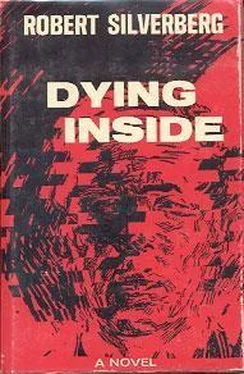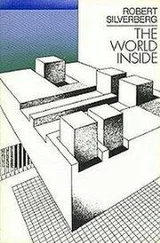How they all hated me for my cleverness! What they interpreted as my cleverness, that is. My sly knack of always guessing what was going to happen. Well, that wouldn’t be a problem now. They’d all love me. Loving me, they’d beat me to a pulp.
* * *
Judith answers the door. She wears an old gray sweater and blue slacks with a hole in the knee. She holds her arms out to me and I embrace her warmly, pulling her tight against my body for perhaps half a minute. I hear music from within: the Siegfried Idyll, I think. Sweet, loving, accepting music.
“Is it snowing yet?” she asks.
“Not yet. Gray and cold, that’s all.”
“I’ll get you a drink. Go into the livingroom.”
I stand by the window. A few snowflakes blow by. My nephew appears and studies me at a distance of thirty feet. To my amazement he smiles. He says warmly, “Hi, Uncle David!”
Judith must have put him up to it. Be nice to Uncle David, she must have said. He isn’t feeling well, he’s had a lot of trouble lately. So there the kid stands, being nice to Uncle David. I don’t think he’s ever smiled at me before. He didn’t even gurgle and coo at me out of his cradle. Hi, Uncle David. All right, kid. I can dig it.
“Hello, Pauly. How have you been?”
“Fine,” he says. With that his social graces are exhausted; he does not inquire in return about the state of my health, but picks up one of his toys and absorbs himself in its intricacies. Yet his large dark glossy eyes continue to examine me every few moments, and there does not seem to be any hostility in his glance.
Wagner ends. I prowl through the record racks, select one, put it on the turntable. Schoenberg, Verklaerte Nacht. Music of tempestuous anguish followed by calmness and resignation. The theme of acceptance again. Fine. Fine. The swirling strings enfold me. Rich, lush chords. Judith appears, bringing me a glass of rum. She has something mild for herself, sherry or vermouth. She looks a little peaked but very friendly, very open.
“Cheers,” she says.
“Cheers.”
“That’s good music you put on. A lot of people won’t believe Schoenberg could be sensuous and tender. Of course, it’s very early Schoenberg.”
“Yes,” I say. “The romantic juices tend to dry up as you get older, eh? What have you been up to lately, Jude?”
“Nothing much. A lot of the same old.”
“How’s Karl?”
“I don’t see Karl any more.”
“Oh.”
“Didn’t I tell you that?”
“No,” I say. “It’s the first I’ve heard of it.”
“I’m not accustomed to needing to tell you things, Duv.”
“You’d better get accustomed to it. You and Karl—”
“He became very insistent about marrying me. I told him it was too soon, that I didn’t know him well enough, that I was afraid of structuring my life again when it might possibly be the wrong structure for me. He was hurt. He began lecturing me about retreats from involvement and commitment, about self-destructiveness, a lot of stuff like that. I looked right at him in the middle of it and I flashed on him as a kind of father-figure; you know, big and pompous and stern, not a lover but a mentor, a professor, and I didn’t want that. And I started thinking about what he’d be like in another ten or twelve years. He’d be in his sixties and I’d still be young. And I realized there was no future for us together. I told him that as gently as I could. He hasn’t called in ten days or so. I suppose he won’t.”
‘‘I’m sorry.
“No need to be, Duv. I did the smart thing. I’m sure of it. Karl was good for me, but it couldn’t have been permanent. My Karl phase. A very healthy phase. The thing is not to let a phase go on too long after you know it’s really over.”
“Yes,” I say. “Certainly.”
“Would you like some more rum?”
“In a little while.”
“What about you?” she asks. “Tell me about yourself. How you’re making out, now that—now that—”
“Now that my superman phase is over?”
“Yes,” she says. “It’s really gone, eh?”
“Really. All gone. No doubt.”
“And so, Duv? How has it been for you since it happened?”
* * *
Justice. You hear a lot about justice, God’s justice. He looketh after the righteous. He doeth dirt to the ungodly. Justice? Where’s justice? Where’s God, for that matter? Is He really dead, or merely on vacation, or only absent-minded? Look at His justice. He sends a flood to Pakistan. Zap, a million people dead, the adulterer and the virgin both. Justice? Maybe. Maybe the supposedly innocent victims weren’t so innocent after all. Zap, the dedicated nun at the leprosarium gets leprosy and her lips fall off overnight. Justice. Zap, the cathedral that the congregation has been building for the past two hundred years is reduced to rubble by an earthquake the day before Easter. Zap. Zap. God laughs in our faces. This is justice? Where? How? I mean, consider my case. I’m not trying to wring some pity from you now; I’m being purely objective. Listen, I didn’t ask to be a superman. It was handed to me at the moment of my conception. God’s incomprehensible whim. A whim that defined me, shaped me, malformed me, dislocated me, and it was unearned, unasked for, entirely undesired, unless you want to think of my genetic heritage in terms of somebody else’s bad karma, and crap on that. It was a random twitch. God said, Let this kid be a superman, and Lo! young Selig was a superman, in one limited sense of the word. For a time, anyhow. God set me up for everything that happened: the isolation, the suffering, the loneliness, even the self-pity. Justice? Where? The Lord giveth, who the hell knoweth why, and the Lord taketh away. Which He has now done. The power’s gone. I’m just plain folks, even as you and you and you. Don’t misunderstand: I accept my fate, I’m completely reconciled to it, I am NOT asking you to feel sorry for me. I simply want to make a little sense out of this. Now that the power’s gone, who am I? How do I define myself now? I’ve lost my special thing, my power, my wound, my reason for apartness. All I have left now is the memory of having been different. The scars of it. What am I supposed to do now? How do I relate to mankind, now that the difference is gone and I’m still here? It died. I live on. What a strange thing you did to me, God. I’m not protesting, you understand. I’m just asking things, in a quiet, reasonable tone of voice. I’m inquiring into the nature of divine justice. I think Goethe’s old harpist had the right slant on you, God. You lead us forth into life, you let the poor man fall into guilt, and then you leave him to his misery. For all guilt is revenged on earth. That’s a reasonable complaint. You have ultimate power, God, but you refuse to take ultimate responsibility. Is that fair? I think I have a reasonable complaint too. If there’s justice, why does so much of life seem unjust? If you’re really on our side, God, why do you hand us a life of pain? Where’s justice for the baby born without eyes? The baby born with two heads? The baby born with a power men weren’t meant to have? Just asking, God. I accept your decree, believe me, I bow to your will, because I might as well—what choice do I have, after all?—but I’m still entitled to ask. Right?
Hey, God? God? Are you listening, God?
I don’t think you are. I don’t think you give a crap. God, I think you’ve been fucking me.
* * *
Dee-dah-de-doo-dah-dee-da. The music is ending. Celestial harmonies filling the room. Everything merging into oneness. Snowflakes swirling beyond the windowpane. Right on, Schoenberg. You understood, at least when you were young. You caught truth and put it on paper. I hear what you’re saying, man. Don’t ask questions, you say. Accept. Only accept, that’s the motto. Accept. Accept. Whatever comes to you, accept.
Читать дальше












